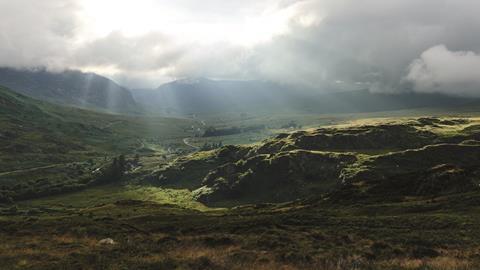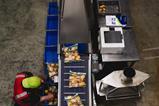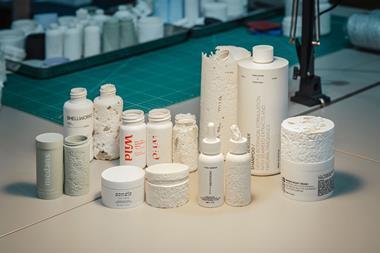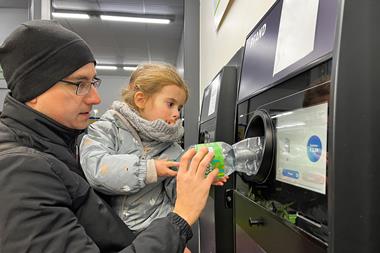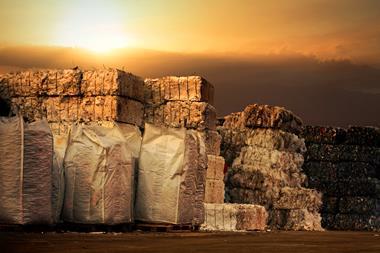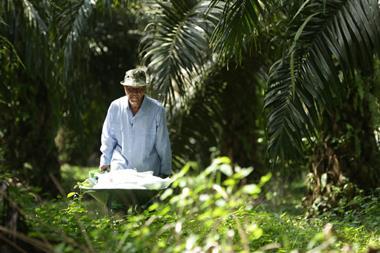While sustainability goals could just end up being an on-paper strategy, the Welsh Government is determined to show that action speaks louder than words in effecting real change in the country’s food and drink businesses.
UK food and drink businesses are coming under increasing pressure to show they are moving beyond theoretical discussion on their sustainability strategies and taking direct action to effect change.
With 56% of Gen Z consumers willing to pay more for brands that try to have a positive impact on society or run their business in a sustainable way, there is a competitive edge to be gained for businesses that embrace environmental and ethical issues. However, these also go beyond care for the environment and into deeper issues such as care for employees (60%) and authenticity (55%).
However, a plan or strategy is only as good as the computer it is drafted on. In 2019, a report from the Welsh Government, which looked back on sustainability progress in Wales since the United Nations’ Sustainable Development Goals were set out in 2015, noted: “Changes to legislation are only as good as the implementation.”
In that short sentence, the report encapsulated the need for direct action on the ground when it comes to sustainability – walking the talk to gain real on-the-ground change and help Welsh businesses understand why, where and how to approach improvements in their environmental efforts, with the overarching goal of reaching the Welsh Government’s target to make the country net zero by 2050.
Direct action
Over the past 12 months, building on the strength of existing initiatives such as the Sustainability Cluster, the Advanced Manufacturing Research Centre and the Food Innovation Wales centres, attention was turned to ensuring a consistent understanding and approach to sustainability across the food and drink manufacturing industry.

Via the work of Food Skills Cymru (Lantra), a Sustainability course was developed, piloted and then rolled out for free to food and drink manufacturing businesses. Organised in six modules, the first three address specific elements of sustainability, including decarbonisation, zero waste, support for natural systems, fair and responsible employment, social and staff wellbeing, and community impact. The latter three enable participants to develop their own bespoke sustainability strategy, integrating the specific elements into a holistic, long-term approach that will be coherent with government policy at a Welsh and UK level, be resonant with the sustainability strategies of large corporates and be appealing to consumers. The course includes plenty of opportunity for discussion, group work and learning from peers, with success measured by practical outcomes.
Within the training 20-minute breakout sessions enabled participants to discuss their particular issues. “It’s a question of making a difference to the planet, so companies are happy to share their experiences and don’t have any competition reservations or information sharing issues on these topics,” explains Sarah Lewis, deputy director at training provider Lantra Wales Since the programme’s initiation in November 2021, 43 businesses and 60 individuals completed the training in a 12-month period to October last year.
As the Sustainability course was being rolled out, a report commissioned on decarbonising the industry identified as a key recommendation the need for relevant workshops specific on decarbonisation to be delivered. The go-ahead was therefore given to set up five pilot decarbonisation workshops in association with GEP Environmental, designed as more of a technical deep-dive into how companies could work in practical terms to advance their decarbonisation goals. The workshops ranged from energy efficiency and management to the decarbonisation of cooling and refrigeration systems, as well as heating systems, food waste and packaging, with 45 participants completing the pilot project last year.
Businesses are able to attend the workshop that is most relevant to them completely free of charge. This is very much a journey for businesses and the support put in place is helping them move their knowledge base.
Feasibility studies
To shift businesses from learning towards implementation, funding for pilot feasibility studies to improve sustainability has recently been offered to businesses who attended the Sustainability training course. The feasibility studies aim to identify the benefits and challenges, including potential costs, for a business to modify their processes, technology or infrastructure to become more sustainable, be that to produce less waste, reduce their energy consumption or carbon emissions.
The pilot studies provided up to £15,000 per business and the results of these will inform the design of the next phase. The intention of the Welsh Government is to help as many businesses as possible.
The next steps on the sustainability journey are already in place. From January to March 2023, a series of 20 decarbonisation workshops will be delivered online “explaining the policies of decarbonisation and achieving net zero in Wales, UK-wide and globally, as well as the commercial benefits that can be derived from them”, says Lewis. “Consumers are going to want to see this played out by businesses. There are, of course, implementation costs, but also long-term benefits.”
In addition, a toolkit to help businesses assess their strengths and weaknesses in relation to sustainability is currently being developed and will be made available for free in April.
Case studies from Wales suggest there is a sense of real progress on the ground with significant action being taken:
Case study 1: Sticle Vineyard
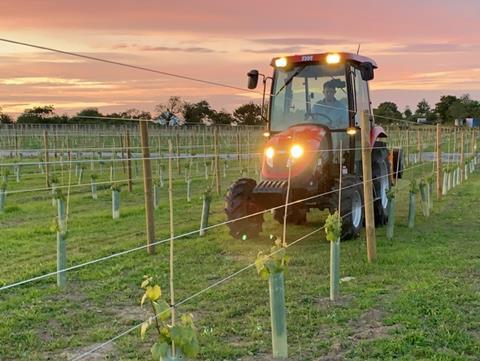
Carmarthenshire-based Sticle Vineyard, established in 2019, is one of the largest vineyards in Wales, comprising 25 acres filled with 10,000 sparkling wine vines of Chardonnay, Pinot Noir and Pinot Meunier.
The organic/biodynamic vineyard (pending certification), which is currently processing its application to become B-Corp certified this year, aims to deliver zero waste and zero carbon emissions across all its facilities, from the vineyard, winery and wine tourism, while removing additional CO2 from the atmosphere using gardens and orchards covering a combined 15 acres and an additional 15 acres of vineyard planned for 2024.
Managing director Christiane Racine says the company intends to invest more this year, with the next phase planned being a zero-waste organic winery.
Last year, the company participated in the sustainability workshops provided by Food Skills Cymru and was invited to join the pilot decarbonisation training programme. Racine says: “On completing all five workshops that were relevant for developing a sustainable business model for the Welsh wine industry, we will continue to address decarbonisation with knowledge, have an open mind to adapt and adopt new solutions in viticulture and viniculture, and promote change to our industry to reduce CO2.
“Decarbonisation is the only way forward if we are to limit the 1.5°C temperature rise threshold by 2050.
“I am very impressed with Food Skills Cymru’s approach to providing awareness, support and training to Welsh businesses for their potential implementation of sustainable solutions in addressing the current climate change crisis.”
Case study 2: Dairy Partners
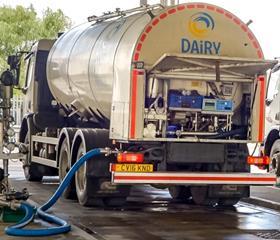
One company in the midst of undertaking a feasibility study to effect change further, enhance its sustainability credentials and derive economic benefit is Dairy Partners. With facilities in Newcastle Emlyn in Wales and Stonehouse, Gloucestershire, the company supplies mozzarella cheese to food manufacturers and foodservice providers in the UK and across the globe.
Its site in Wales has a direct milk supply contract with more than 130 local farmers within a 40-mile radius.
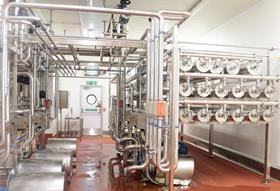
In recent years, the company has already invested in several measures to improve its environmental credentials, all with an eye on achieving an economic benefit, reveals business intelligence lead Carwyn Jones. These include: adding membranes to its whey processing plant, increasing the solids from around 18.5% to 24% and resulting in fewer tankers on the roads; as well as installing a water polisher to reduce its dependence on mains water; and installing a brand new waste water treatment plant.
Now, having undertaken the Welsh Government’s sustainability training, the company is using the feasibility grant to investigate de-steaming its processes, with a provider already metering and measuring the site and looking at the potential of installing a new boiler. “It makes perfect sense and the process so far has highlighted another couple of improvements that it will bring, including potentially preventing or bringing up any diversion to the hot water system much more quickly, saving time, energy and allowing for a much more consistent product,” says Jones.
He says the sustainability training was “an eye-opener”. “For me, sustainability was all about the environment and greenhouse gases. But after doing the course, you realise it’s also about the community your business is in, your staff and all your stakeholders. It’s a much broader picture than just the environmental aspect.”
To find out more about sustainability training in Wales email sustainablefd@gov.wales








